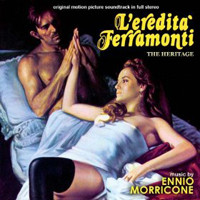- Composed by Ennio Morricone
- GDM Hillside / 2013 / 48m
A 1976 film directed by Mauro Bolognini, L’Eredita Ferramonti was known as The Inheritance in English-speaking countries (or even The Heritage, according to this album’s cover). Bolognini worked on numerous occasions with the great Ennio Morricone; while few of their collaborations have become that well-known outside the devoted fanbase of the composer, they include some real gems, of which this is one. It is bolstered considerably by one of those Morricone themes – you know what I mean. Presented in the opening cue, “Irène-Dominique”, it’s a glorious romantic theme with a stately air that simply lights up the room whenever it is heard. Morricone has frequently included it in his concert programmes over the years and it’s easy to see why – such an elegant piece and yet so ravishingly emotional. The elegance continues in the sightly understated “Pensiero d’amore”, a love theme which seems to hold something back, to be sure of being considered right and proper. “L’altra notte” (heard in two different forms) is a more mysterious piece, slightly discordant string phrases appearing from the darkness, returning to the shadows, their constant companion a simple piano line ushering them in and out of consciousness.
In the standalone “Entrata in chiesa”, a children’s choir sings one of those wonderful liturgical pieces this composer has somehow been able to write so frequently for films. “Disperazione” offers a glorious, free-flowing version of the main theme that stands out as a real highlight; contrast with the more intimate tone of “Ricordo d’amore” for an example of how this extraordinary composer can take the same melody and use it to create such different moods. “Polka prima” and “Polka seconda” are – well, they’re polkas – and delightful ones at that. There’s a waltz too, “Valzer per… la buona società”, an opulent piece of court music, full of the sound of wealth and privilege. The gently-paced “Ostinato d’amore” is full of passion, a beautiful portrait of love. A brief break from the free-flowing melodies arrives in “Morte di Ferramonti”, an unsurprisingly dark, at times awkward piece; then the saloon piano-style source “Una canzone della strada”. The original album programme concludes with another piece called “Pensiero d’amore”, though (not untypically) rather confusingly it doesn’t feature the melody from the piece with the same name earlier on the album, instead another version of the stunning main theme. GDM Hillside’s extended release adds a few more variations on existing tracks (about 15 minutes in total); but there are no liner notes and the sound isn’t that great. Still, this is a wonderful score from the maestro featuring an indelible main theme.
Rating: **** 1/2
facebook.com/moviewave | twitter.com/MovieWaveDotNet | amazon.com












Morricone’s relationship with director Mauro Bolognini, which spanned twenty years, inspired him to produce so much wonderful music. I think the pinnacle of this collaboration would be ‘La Storia Vera Della Signora Dalle Camelie’ from 1980 which is achingly beautiful while colored with a deep sadness. Their next film ‘La Venexiana’ in 1986 is another of my favorites. While not one of the most famous directors Morricone worked with, it’s a body of work well worth exploring..